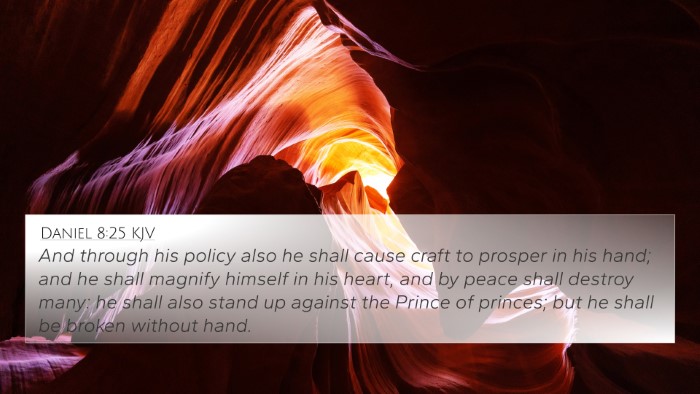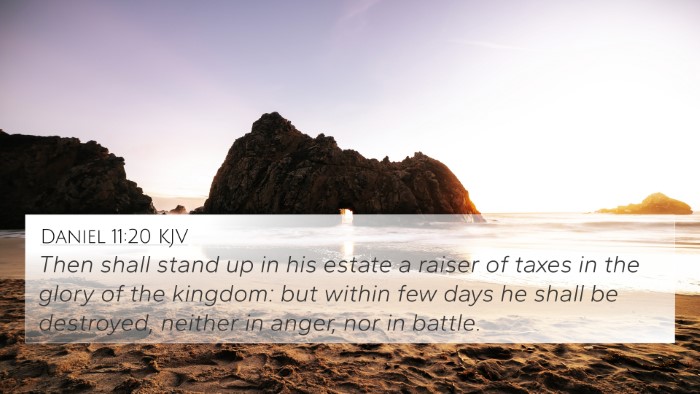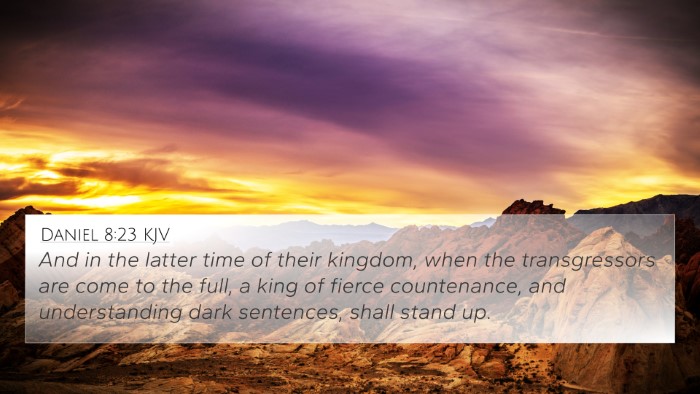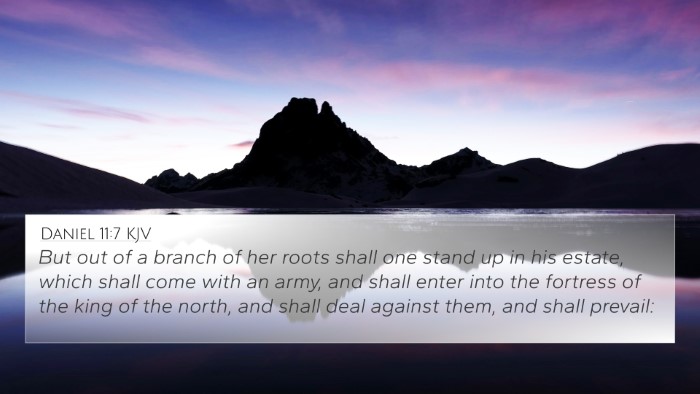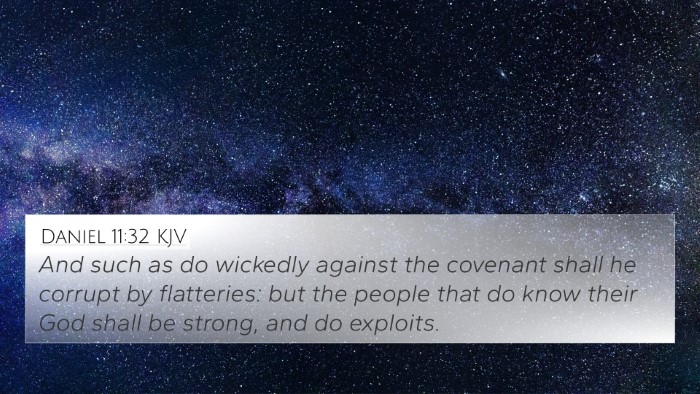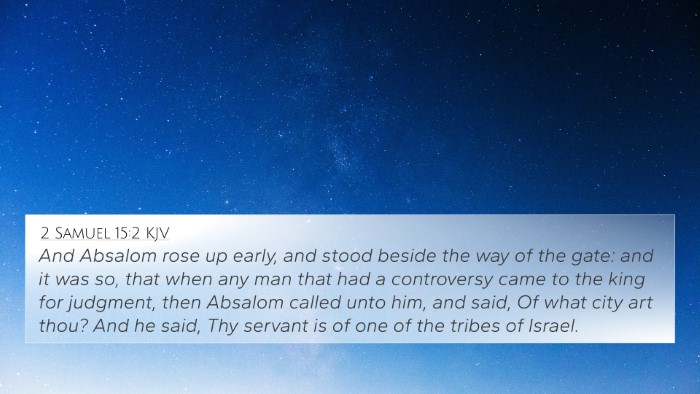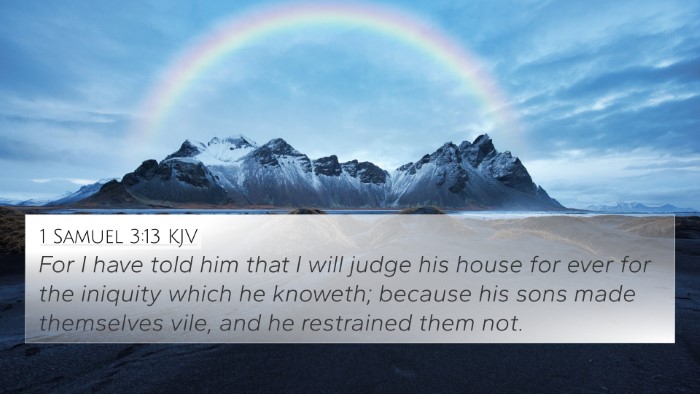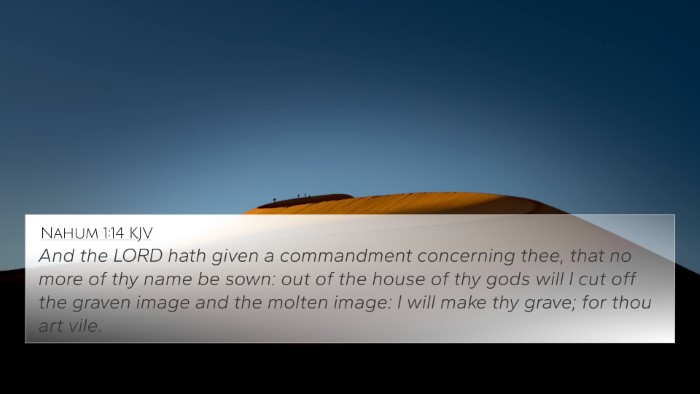Understanding Daniel 11:21
Verse: "And in his estate shall stand up a vile person, to whom they shall not give the honour of the kingdom: but he shall come in peaceably, and obtain the kingdom by flatteries." (Daniel 11:21)
Summary of Insights
This verse from Daniel refers to the rise of a deceptive leader who gains power not through legitimate means, but by manipulation and charm. This leader is characterized as 'vile', indicating a lack of integrity or moral standing. The prophetic context points toward future events where such leaders will emerge during turbulent times.
Commentary Insights
1. Matthew Henry's Commentary
Matthew Henry elaborates that the term "vile person" can refer to someone of lowly origin who uses cunning and flatteries to achieve power. This indicates a trend in history where leaders may not always come from noble backgrounds but rise through insidious means. Henry emphasizes the irony of how such unworthy leaders are sometimes favored by the people through their deceptive practices.
2. Albert Barnes' Commentary
Albert Barnes points out that the phrase "to whom they shall not give the honour of the kingdom" suggests that this leader will not receive the respect or legitimacy that typically accompanies positions of power. He will capitalize on the chaos of the times, gaining influence not through rightful claim but through manipulation. Barnes highlights this as a warning against those who prioritize ambition over righteousness.
3. Adam Clarke's Commentary
Adam Clarke comments that the peaceful manner of this rise to power indicates a broader theme of false peace. The leader's approach will appeal to the desires and fears of the populace, allowing him to gain control without the usual conflict associated with such transitions. Clarke suggests that this reflects a scriptural pattern of God's judgment allowing such leaders to emerge in times of moral decay.
Cross-References Related to Daniel 11:21
- Isaiah 32:5-8: Highlights the distinction between the righteous and the vile, emphasizing the eventual exposure of those who do not practice integrity.
- 2 Thessalonians 2:3-4: Refers to a "man of sin" who exalts himself and deceives, paralleling the characteristics of the "vile person."
- Matthew 24:24: Warns of false prophets and messiahs who will mislead many, showing a continuity in the theme of deceptive leadership.
- Revelation 13:11-12: Discusses a beast that speaks like a dragon, reflecting the method of gaining power through deceit and wonder.
- Ezekiel 28:2: Discusses a prince who claims divinity for himself, drawing a comparison to the ambition of the vile person in Daniel.
- Psalm 55:21: Details the deceiving nature of people whose words are smooth yet harbor malice, echoing the tactics of manipulation.
- Proverbs 29:12: Indicates that when a ruler listens to falsehoods, it can lead to oppression, a warning relevant to the context of unworthy kings.
Thematic Connections
This verse forms part of a broader narrative within the Book of Daniel, illustrating the recurring theme of God’s sovereignty in allowing certain leaders to rise, particularly in the context of Israel's struggle against foreign powers. By cross-referencing this scripture with those mentioned, one can see a pattern of divine justice being played out through history's unfolding events.
Tools for Bible Cross-Referencing
Utilizing a Bible concordance or cross-reference Bible study tools can significantly enhance understanding of scriptures like Daniel 11:21. These tools facilitate deeper explorations of cross-referenced themes, enabling one to identify connections between Old and New Testament passages.
Final Thoughts
As we analyze Daniel 11:21 alongside various biblical texts, a clearer picture of the complexities of leadership during turbulent times emerges. The warnings and lessons documented in scripture highlight the importance of discernment in recognizing the nature of leaders and the means through which they attain authority.
Keywords:
- Bible verse cross-references
- Connections between Bible verses
- Linking Bible scriptures
- Comparative Bible verse analysis
- Bible verses that relate to each other
- Cross-referencing Biblical texts
- Thematic Bible verse connections
- Bible verse parallels
- Scriptural cross-referencing
- Inter-Biblical dialogue






